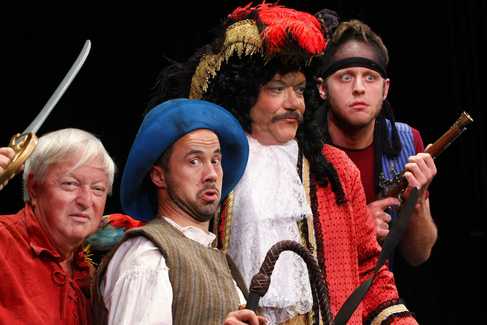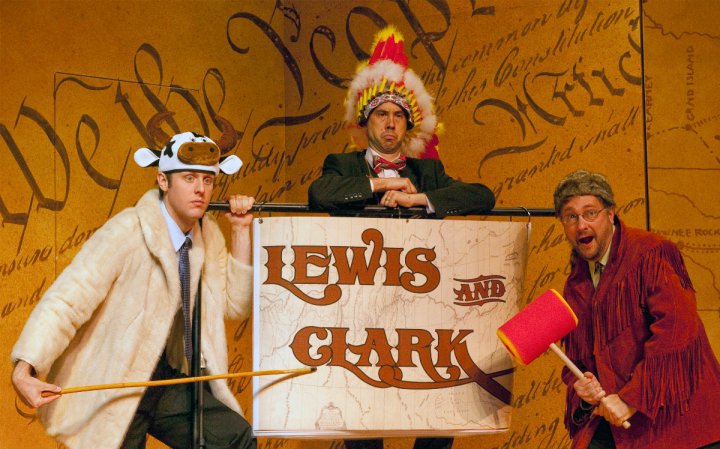 |
| Rasmussen as Smee |
Summer McCusker, who just graduated from Columbus State University with a degree in theater performance, is happy to be tiny enough to play Peter Pan.
In past Springer Opera House productions, she’s played JoJo in “Seussical” and 12-year-old Frankie in “The Member of the Wedding.” Now she can add ”Peter Pan” to her resume.
McCusker loves children’s theater so much that right after the holidays and the end of run of “Peter Pan,” she’ll be touring for three months with the National Theater for Children of Minnesota, the largest children’s theater in the United States.
It was her first tour as a CSU student in “The Garden of Rikki Tikki Tavi” that made her fall in love with children’s theater.
“My forte is in children’s theater,” she said. “I toured with ‘The Garden of Rikki Tikki Tavi’ and that’s when I found my niche.”
Playing Peter Pan has been one of McCusker’s dreams since she was a little girl growing up in Miami. “I used to play Peter Pan when I was a kid,” she said. “I am an only child, so I had to play by myself.”
To “fly,” the Springer had to hire Flying by Foy, the riggers that invented the system that allows actors to fly across the stage. This company is the only one licensed to fly actors for “Peter Pan.”
“Jason White from Flying by Foy was just great,” said director and Springer artistic director Paul Pierce. “He brought some new flying tricks. I wasn’t prepared for anything new. We will have some real ‘wows!’.”
McCusker adds: “Peter Pan has a few tricks up his sleeve.”
It’s been seven years since the Springer last produced “Peter Pan.”
Last time, Pierce used high school and college students as the Lost Boys. This year, he’s using Springer Theater Academy students.
“The Lost Boys are significantly younger,” he said. “They are a handful because they are real boys.”
Kimberly Faith Hickman, who currently is the assistant to the producing artistic director at the Springer, is the associate director and choreographer for the production.
“Kimberly has really put her mark on this show,” Pierce said. Because he was directing “Why, Baby, Why,” he couldn’t be at the first few weeks of rehearsal. Hickman took over that role while he was in Foley Hall.
“She just started directing the play,” Pierce said. “She brought a unique and very special touch to the show.”
“You’ll love the pirates’ choreography,” said Jens Rasmussen, who is playing Smee.
Rasmussen just finished a production of the drama “Doubt,” in Virginia. He did the role of Father Flynn, who is accused of molesting a boy, at the Springer last season.
“I’m playing Smee,” Rasmussen said. “It’s very silly. It’s great because I just did ‘Doubt’ again. This is a nice change.”
Another pirate, Cecco, played by Adam Archer, loves the play. “It’s so much fun,” he said. “It’s nice to do some character work.”
Rasmussen said the pirates are so over the top that they can get away with a lot. For handsome Adam Clough, who is mostly cast as the leading man in musicals, he’s loving the time as Capt. Hook.
“I do a lot of leading man stuff,” Clough said. “So it’s nice to be bad for a while. It’s so good to be bad. I’m really enjoying myself.”
Pierce is pleased to find an exceptional comic actor under Clough’s good looks, he said.
Besides McCusker, Heather Willis as Wendy, Dustin Dawson as John and Jacob Lowery as Michael, all fly.
“I really liked it,” Willis said. “The first thing I asked was if I get to fly.”
Even though “Peter Pan” is a children’s story that’s been read to millions of children around the world, there is a little controversy, especially in the way the Indians are portrayed.
“You have to remember that this is a story told through the eyes of privileged English children,” Pierce said. “So this is what 19th century English children thought pirates and Indians were like.”
Pierce is aware that the depiction is “an unpolitically correct” element. But he didn’t want to shy away from it.
“We stereotype fairies, too,” he said with a laugh.
And during the holidays, he wanted to present something familiar and something fun.
“For 138 years, the Springer has been doing shows through wars, bank panics, the Depression. Stage entertainment goes on. You can sit in a dark, windowless room and let the outside world disappear for a few hours.”
BY SANDRA OKAMOTO








